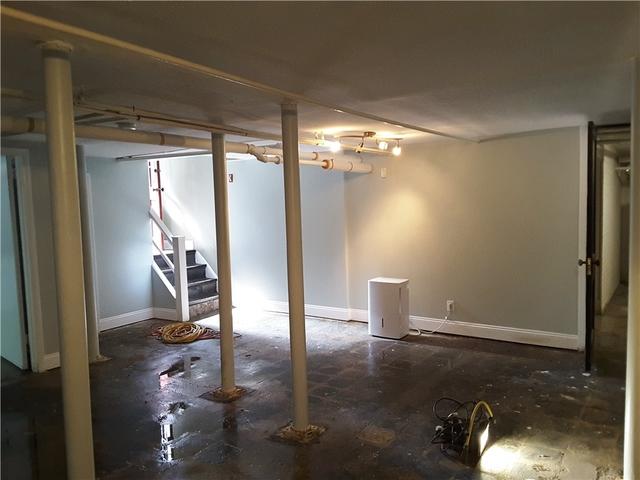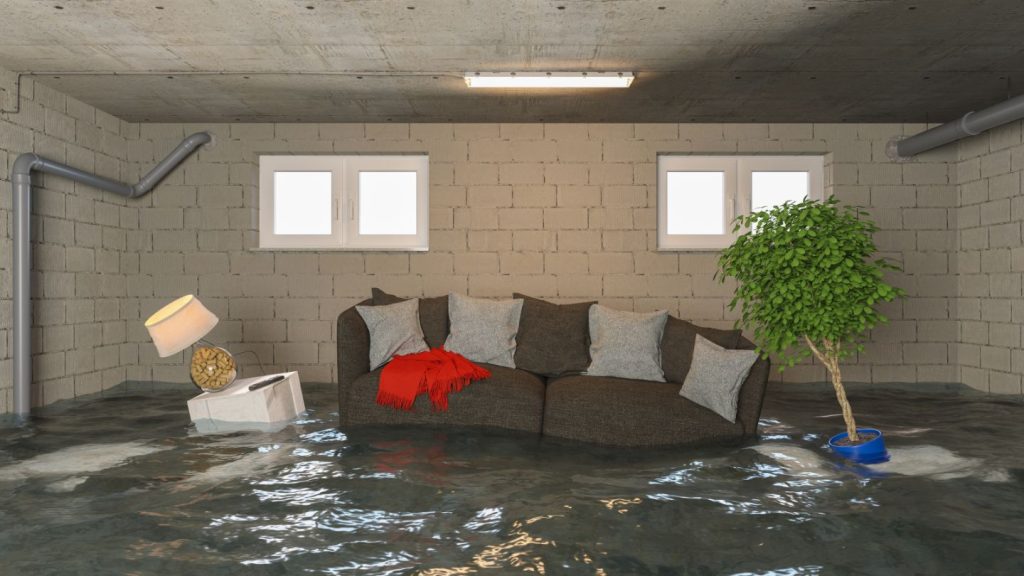Basement flooding is a homeowner’s nightmare, causing extensive damage to property and structures. Recognizing the primary causes is pivotal for prevention and early intervention. Let’s explore the ten most common causes:
1. Neglected Gutters and Downspouts
Clogged or poorly maintained gutters and downspouts can channel water toward the foundation, leading to basement flooding and seepage during heavy rainfall.
2. Foundation Cracks and Leaks
Cracks or openings in the foundation walls or floors serve as entry points for water, allowing it to infiltrate and cause basement flooding, especially during wet weather conditions.
3. Poor Sealing and Waterproofing
Insufficient sealing or waterproofing of basement walls and floors renders them susceptible to water intrusion, resulting in flooding from groundwater seepage.
4. Sump Pump Failure
Malfunctioning or overwhelmed sump pumps contribute significantly to basement flooding by failing to remove excess water, leading to accumulation efficiently.
5. Sewer Backup
Heavy rainfall or sewer line blockages can cause sewage to return to basements via drains or plumbing fixtures, causing severe flooding and contamination.
6. Poor Grading or Sloping
Incorrect grading around the foundation or insufficient slope directing water away from the house encourages water pooling, heightening the risk of basement water infiltration.
7. Window Well Issues
Improperly drained or inadequately sealed window wells have the potential to accumulate water, which can eventually seep into the basement through windows, leading to flooding if not correctly maintained.
8. Aging Plumbing Systems
Aging or faulty pipes within the basement are prone to leaks or deterioration, contributing to water accumulation and potential flooding.
9. HVAC System Problems
Dysfunctional HVAC systems, particularly air conditioning units or water heaters situated in basements, can cause leaks or condensation, resulting in flooding if unattended.
10. Natural Disasters and Extreme Weather
Severe weather events such as heavy rains, flash floods, storms, or rapid snowmelt can overwhelm drainage systems, especially in vulnerable regions.

How Do I Know If My Basement Is at Risk of Flooding?
Your basement is susceptible to potential flooding, posing risks to your property and safety. Understanding the indicators that suggest your basement might be at risk of flooding is crucial for proactive measures to mitigate potential damage.
Here’s a comprehensive guide on how to assess if your basement is at risk of flooding:
Location and Surroundings
Consider the geographical location of your home. Properties in low-lying areas, near bodies of water, or regions prone to heavy rainfall are more susceptible to basement flooding.
Previous Incidents
Review the history of your property for any past incidents of basement flooding. A previous occurrence indicates potential future risks, primarily if the main issue was not resolved effectively.
Inspection of Foundation and Exterior
Check the foundation and exterior of your home for signs of damage, cracks, or deterioration. Any weaknesses in these areas can allow water infiltration, putting your basement at risk of flooding.
Poor Drainage Systems
Inadequate or clogged gutters, downspouts, or improper grading around the house can lead to water pooling near the foundation. This pooling increases the risk of water seeping into the basement.
High Water Table
Properties in areas with a high water table, where the groundwater level is close to the surface, may experience basement flooding during heavy rain or melting snow.
Plumbing Issues
Inspect your plumbing systems regularly for leaks or aging pipes, especially those in or near the basement. Faulty plumbing can contribute to basement flooding.
Proximity to Sewer Systems
Homes located near municipal sewers or with aging sewage systems might be at risk of sewer backups during heavy rainfall, leading to basement flooding.
Weather Patterns and Predictions
Keep yourself updated with your local area’s weather conditions and upcoming forecasts. Consistent heavy rainfall, flash flood warnings, or extreme weather events can elevate the risk of basement flooding.
Use of Basement Space
Basements used for storage, with electrical systems or valuable items, increase the significance of protecting against flooding. Such uses necessitate proactive measures to safeguard these assets. Avoid storing important documents, valuable possessions, or electrical systems directly on the basement floor, opting instead to elevate items on shelving or platforms to prevent potential damage in case of flooding.
Assessment by Professionals
Hire professionals to thoroughly assess your basement to identify vulnerabilities and mitigate flooding risks. Specialists in basement waterproofing or home inspection can help, offer recommendations early, and help you avoid costly damage to your basement and stored personal objects.

What Steps Should I Take to Prevent My Basement from Flooding?
Routine Maintenance
Clear gutters, downspouts, and drains to ensure proper water flow from the home.
Foundation Inspection
Regularly check and repair any cracks or leaks in the foundation walls and floors. If you notice cracks, leaks, or signs of foundation damage, it’s crucial to consult a foundation specialist or structural engineer for an in-depth assessment and appropriate repairs. Investing in routine foundation maintenance and promptly addressing any identified issues is essential for ensuring the longevity and stability of your home’s foundation and another way to keep your basement from flooding.
Sealing and Waterproofing
Apply sealants or coatings to protect against water infiltration, especially in areas prone to rain and snow.
Sump Pump Care
Test and maintain sump pumps to ensure optimal functioning during heavy rainfall. Sump pumps play a critical role during emergencies caused by heavy rain; ensuring they are well-maintained and tested prepares your home to handle sudden water influxes effectively.
Backflow Prevention
Install backflow prevention devices to minimize the risk of sewer backup. A qualified plumber can assess your property’s needs and recommend the most suitable backflow prevention device to reduce the risk of sewer backup.
Grading and Drainage
Ensure proper grading and slope around the house to redirect water away from the foundation. Look for areas where the ground slopes towards the house, causing water to accumulate near the foundation, and identify low spots or areas where water pools. If the grading adjustments require significant changes or clarification on the proper slope, consult a landscaping professional or grading expert for guidance.
Window Well Maintenance
Ensure your window wells are clean and properly sealed to prevent water from entering your basement through the windows.
Plumbing Checks
Regularly inspect plumbing for leaks and address issues promptly.
HVAC Maintenance
Service and maintain HVAC systems to prevent potential leaks or condensation from causing flooding.
Emergency Preparedness
Maintain flood insurance coverage, know your flood zone, and plan for potential flooding emergencies, including knowledge of utility shutoff procedures.
It is essential to be aware of the common causes of basement flooding and to take preventive measures to reduce the risk. Regular maintenance, inspections, and preparedness are critical to protecting your basement from water damage.
Basement Flooding? Contact United Water Restoration Group for Professional Restoration
United Water Restoration Group offers swift and expert assistance when dealing with water damage due to flooding. Our team of professionals is always ready to respond promptly to emergencies, providing comprehensive restoration services.
Specializing in extraction, drying, and property restoration, United Water Restoration Group ensures a rapid recovery process, guiding property owners through restoration and returning the property to its pre-damage state. Call Us Today!





